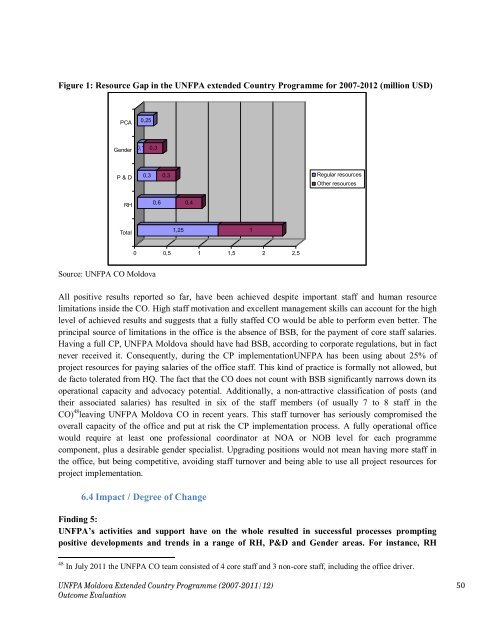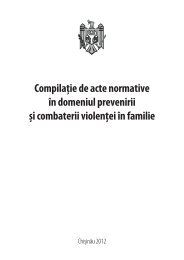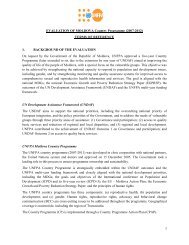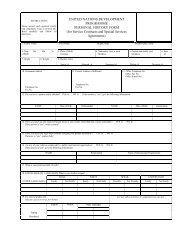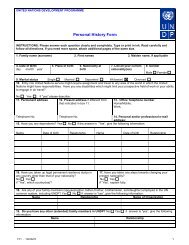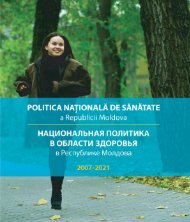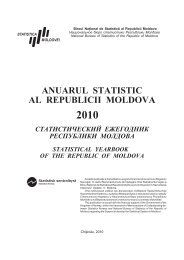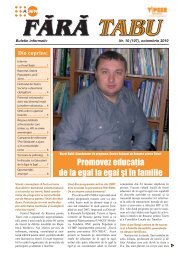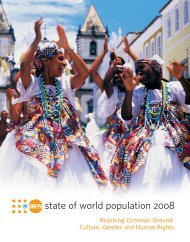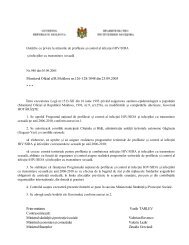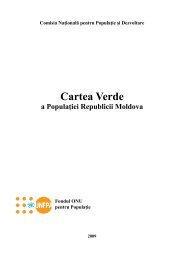Country Programme (2007-2011/2012) evaluation - UNFPA Moldova
Country Programme (2007-2011/2012) evaluation - UNFPA Moldova
Country Programme (2007-2011/2012) evaluation - UNFPA Moldova
You also want an ePaper? Increase the reach of your titles
YUMPU automatically turns print PDFs into web optimized ePapers that Google loves.
Figure 1: Resource Gap in the <strong>UNFPA</strong> extended <strong>Country</strong> <strong>Programme</strong> for <strong>2007</strong>-<strong>2012</strong> (million USD)<br />
PCA<br />
0,25<br />
Gender<br />
0,1 0,3<br />
P & D<br />
0,3 0,3<br />
Regular resources<br />
Other resources<br />
RH<br />
0,6 0,4<br />
Total<br />
1,25 1<br />
0 0,5 1 1,5 2 2,5<br />
Source: <strong>UNFPA</strong> CO <strong>Moldova</strong><br />
All positive results reported so far, have been achieved despite important staff and human resource<br />
limitations inside the CO. High staff motivation and excellent management skills can account for the high<br />
level of achieved results and suggests that a fully staffed CO would be able to perform even better. The<br />
principal source of limitations in the office is the absence of BSB, for the payment of core staff salaries.<br />
Having a full CP, <strong>UNFPA</strong> <strong>Moldova</strong> should have had BSB, according to corporate regulations, but in fact<br />
never received it. Consequently, during the CP implementation<strong>UNFPA</strong> has been using about 25% of<br />
project resources for paying salaries of the office staff. This kind of practice is formally not allowed, but<br />
de facto tolerated from HQ. The fact that the CO does not count with BSB significantly narrows down its<br />
operational capacity and advocacy potential. Additionally, a non-attractive classification of posts (and<br />
their associated salaries) has resulted in six of the staff members (of usually 7 to 8 staff in the<br />
CO) 48 leaving <strong>UNFPA</strong> <strong>Moldova</strong> CO in recent years. This staff turnover has seriously compromised the<br />
overall capacity of the office and put at risk the CP implementation process. A fully operational office<br />
would require at least one professional coordinator at NOA or NOB level for each programme<br />
component, plus a desirable gender specialist. Upgrading positions would not mean having more staff in<br />
the office, but being competitive, avoiding staff turnover and being able to use all project resources for<br />
project implementation.<br />
6.4 Impact / Degree of Change<br />
Finding 5:<br />
<strong>UNFPA</strong>’s activities and support have on the whole resulted in successful processes prompting<br />
positive developments and trends in a range of RH, P&D and Gender areas. For instance, RH<br />
48 In July <strong>2011</strong> the <strong>UNFPA</strong> CO team consisted of 4 core staff and 3 non-core staff, including the office driver.<br />
<strong>UNFPA</strong> <strong>Moldova</strong> Extended <strong>Country</strong> <strong>Programme</strong> (<strong>2007</strong>-<strong>2011</strong>/12)<br />
Outcome Evaluation<br />
50


